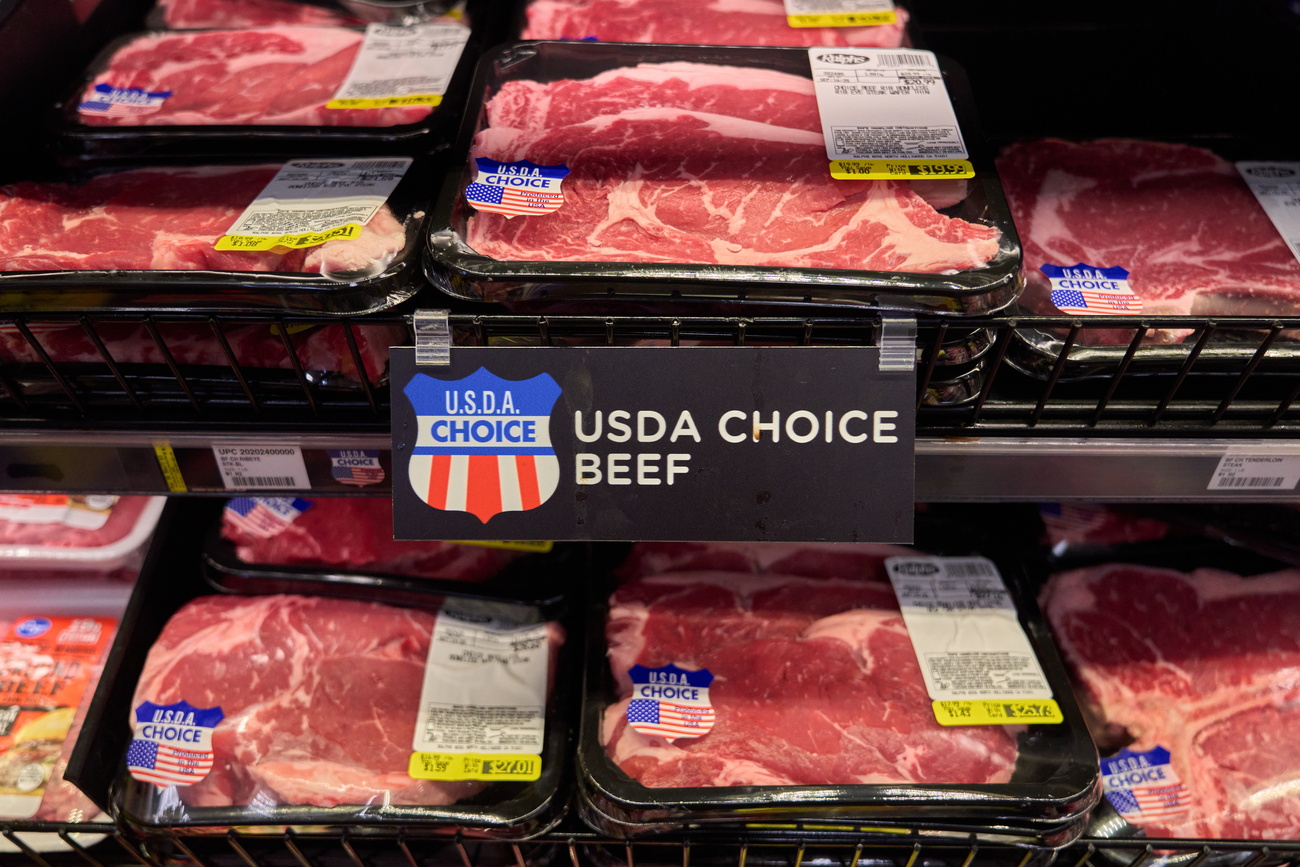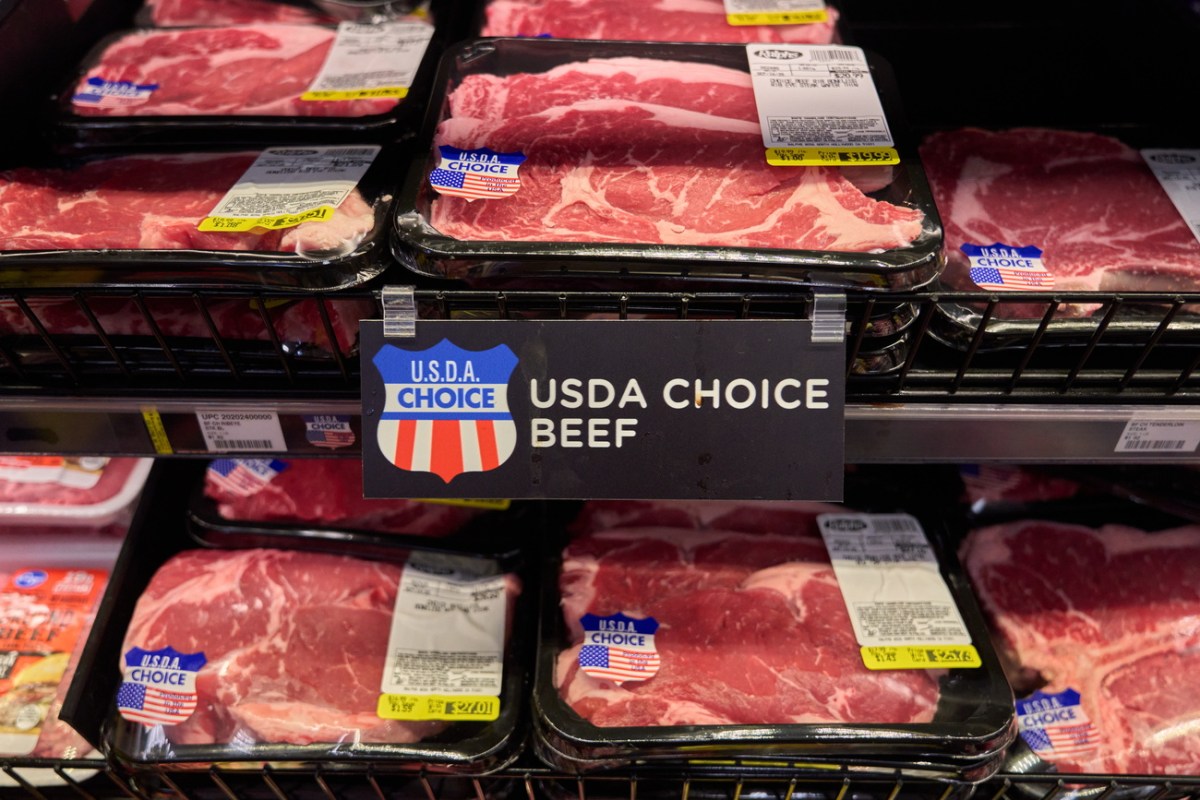
Lower tariffs on American beef could help the US change its mind about Switzerland.
EPA/ALLISON DINNER
The Alpine nation is trying to negotiate its way out of a steep tariff of 39% imposed by the US on August 1. The European Union, which wrangled a much lower tariff of 15%, offered concessions on certain US food imports. Is this an option for Switzerland?
On Swiss National Day (August 1), it is customary for the Swiss to head to a local farm for a traditional brunch of regional specialities. Nothing stirs patriotic feelings like wolfing down a buffet spread of meats, cheese and “Wegge” – a kind of sugary bread made from yeast dough and adorned with a Swiss flag.
This year, however, appetite for fresh farm fare was blunted by an announcement on August 1 of a 39% tariff on all Swiss imports into the United States, the highest in Europe. The announcement caught the Swiss by surprise, as the government was convinced it had negotiated down the 31% tariff announced on April 2 (US President Donald Trump’s so-called Liberation Day) to a more manageable 10%.
The American tariffs on Switzerland will make already pricey Swiss products much more expensive for American consumers and affect sales of premium products like Swiss cheese, watches or machinery.
They also raise the question of what concessions Switzerland can put on the table to appease the Trump administration, which accuses Switzerland of running a trade surplus with the US. One of the options would be to lower tariffs on US agricultural products sold to Switzerland. This would mean more US products in Switzerland and potentially lower quality and animal welfare standards.
“The blanket import tariffs of 39% on Swiss products announced by the US government are hitting the cheese industry hard. The current rate of 10% will be nearly quadrupled – with serious consequences for exports,” says Désirée Stocker, a spokesperson for Switzerland Cheese Marketing.
The Swiss dairy association Swissmilk confirmed that American consumers will have to pay more for their Gruyère cheese.
“Currently, around 8,000 tonnes of Swiss cheese are exported to the US. US import tariffs will lead to price increases on the US market, which may have an impact on sales,” says its spokesperson, Christa Bruegger.
High Swiss tariffs
Gruyère cheese sells for an average of CHF50 ($60) a kilo in the US, more than twice what it costs in Switzerland. With the tariff, it would cost about CHF65 a kilo, which means less Swiss cheese will be sold. The problem is further exacerbated by the fact that Gruyère is not a protected designation in the US, and consumers there can buy cheaper American-made Gruyère, or cheese labelled as Gruyère produced in other European countries that face lower tariffs.
The European Union, which negotiated much lower US tariffs of 15%, made tariff concessions for imported American food products. This includes lower tariffs on specific quotas of products like seafood, nuts, dairy products, fresh and processed fruits and vegetables, processed foods, grains and planting seeds, soybean oil, pork and bison meat. However, it kept sensitive agricultural products such as beef, poultry, rice and ethanol off the negotiating table.
Can Switzerland offer the same kind of concessions to appease Trump and negotiate a better deal for itself? Liberal Swiss thinktank Avenir Suisse definitely thinks so.
“Those who demand fair trade conditions in Washington should not ignore their own barriers,” says a recent analysisExternal link on what Switzerland needs to do to remain credible in economic policy.
According to customs data, Switzerland exported CHF1.59 billion (about $2 billion) worth of agricultural products to the US in 2024, which was more than five times the value of Swiss imports of American agricultural products.
One of the reasons for this trade imbalance is the high tariffs Switzerland imposes on agricultural products it imports, which can exceed 100% for certain products such as cheese, meat or vegetables.
“The average trade-weighted agricultural tariff [the total tariff revenue divided by the total value of imports] stood at 21.3% in 2024 – almost 2.5 times higher than in the EU and five times higher than in the US,” says Michele Salvi, vice-director and a senior fellow at Avenir Suisse.
By contrast, average Swiss tariffs on non-agricultural products are negligible, at only 0.6%. According to Salvi, this imbalance weakens Switzerland’s negotiating position. He wants Swiss agricultural tariffs to be on the negotiations table, especially since agricultural products represented only around 3.5% of Swiss exports in goods in 2024.
Room for maneuver
Surprisingly, the Swiss agricultural sector is not completely resistant to the idea of letting more US products into Switzerland
“Our industry is open to considering concessions specifically for cheese. Of course, the protection of AOP [Protected Designation of Origin] cheese varieties must also be ensured when importing US cheese into Switzerland,” says Stocker of Switzerland Cheese Marketing.
The politically powerful Swiss Farmers’ Union is also open to concessions, but not for all products.
“We have no problem with the proposed tariff reductions for products such as oranges and seafood. The situation would be different if Switzerland were to make concessions on meat, for example, which is a sensitive agricultural product,” says spokesperson Sandra Helfenstein.
One of the reasons meat in Switzerland is the most expensive in Europe is because there are limits on the number of animals than can be kept on a farm. The law allows a maximum of 300 veal calves, 1,500 pigs or 18,000 hens per farm whereas in EU countries, there are no such limits.
“At the political level, it is the task of the Federal Council [executive body] to put the current customs situation with the US on a new basis. We strengthen our government by remaining silent,” says Bruegger of Swissmilk.
When contacted, the economics ministry did not wish to comment on whether Swiss agricultural tariffs were up for negotiations with the US.
“Discussions are currently continuing at various levels. The Federal Council will provide further information in due course,” says spokesperson Markus Spörndli.
Let the consumer decide?
Consumer preference will also decide if tariff concessions are palatable for the Swiss agricultural sector. Take meat from American cattle treated with growth-promoting hormones, for example. Such meat can be sold in Switzerland provided testing in Switzerland does not reveal any residue of hormones. The Swiss meat industry is quietly confident that Swiss consumers will not embrace American beef even if it is cheaper.
“American beef contains hormones and is therefore not in high demand in Switzerland. Therefore the market [consumers] as well decides what it needs and what has to be imported,” says Haeberli of Proviande.
Switzerland has incorporated into its national law on technical barriers to trade the Cassis de Dijon principle, which was developed by the European Court of Justice. The principle stipulates that a product that complies with EU regulations and is sold in an EU country can also be sold in Switzerland without any additional requirements. However, there are certain exceptions, like eggs from battery farms or products containing genetically modified organisms.
“It may be that the range of products available to consumers in Switzerland would become somewhat more diverse – but also less transparent. Many standards in the US are lower than in Switzerland or the EU, ranging from animal welfare to genetically modified products or additives that are banned in Switzerland,” says Josianne Walpen, head of nutrition at the Swiss Consumer Protection Association.
Walpen wants Swiss consumers to be informed about how American food products are produced and processed, especially if such practices are banned in Switzerland. For example, through labelling that declares that chicken meat was disinfected with chlorine-based solutions or the use of hormones and antibiotics to boost growth in beef cattle. Such declarations are currently mandatory but Walpen is concerned that this could be watered down if concessions are made to the US.
“It remains to be seen whether this declaration requirement for meat and genetically modified products would remain in place. In addition, the declaration requirements in the US are less consumer-friendly than in Switzerland,” she says.
Edited by Virginie Mangin/gw

